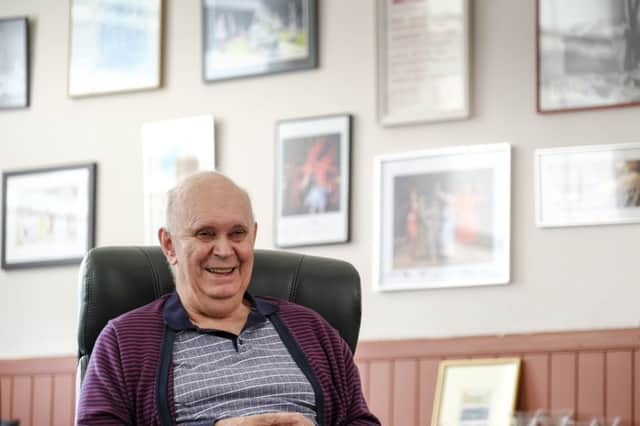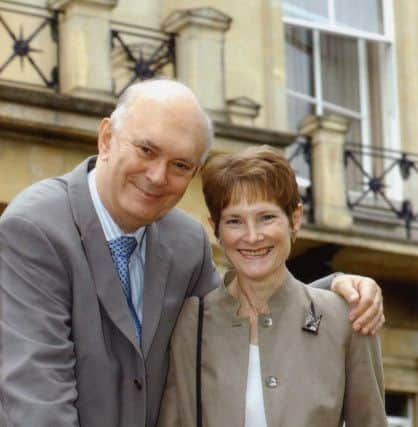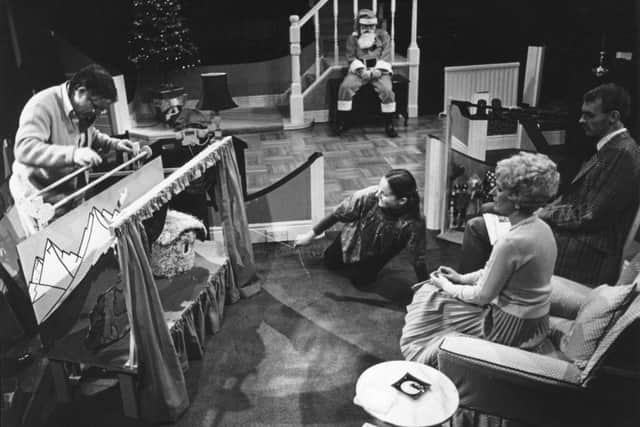Sir Alan Ayckbourn at 80: Exclusive interview with the Yorkshire playwright


As artistic director of the Stephen Joseph Theatre (as it later became known) from 1972 to 2009, Ayckbourn established himself as one of the great dramatists of our time, making the Yorkshire seaside town an unlikely theatrical mecca to boot.
Today, he’s still working and gearing up for the forthcoming summer season. Each year he does back-to-back productions at the SJT – a revival of something from his extensive back catalogue along with a new play. This year’s revival is Season’s Greetings and the latter is Birthdays Past, Birthdays Present – which tells the story of a family of four through different birthdays that goes back in time. “I thought what am I going to write for my 80th? I like to pin things on anniversaries and I thought ‘why not birthdays?’ In the end I wrote this one quite fast in just three or four weeks, which was good because it shows I’ve still got the old mojo going,” he says, with a chuckle.
Advertisement
Hide AdAdvertisement
Hide AdWe’re sitting in the smart living room of the South Bay townhouse that has been his family’s home for the past 45 years.


Ayckbourn’s career has been a remarkable one, though there was little indication of the titan of theatre he was to become when he initially arrived on Yorkshire’s coast as a callow teenager in the summer of 1957.
He’d been enticed north from his home in the South East to work as an assistant stage manager with the pioneering Stephen Joseph, who had established the country’s first theatre-in-the-round company in Scarborough on the first floor of the public library two years earlier. “It wasn’t until I joined this theatre with Stephen Joseph that I really started writing, because he had this extraordinary notion of guaranteeing you a production.”
But although Ayckbourn had shown signs of wanting to be a writer, his real ambition was to be an actor. “One day Stephen overheard me bitching about a play we were in. I said ‘anybody could write rubbish like this’ and he said ‘if you think you can write a better one, then write it.’”
Advertisement
Hide AdAdvertisement
Hide AdFlush with the “folly” of youth he accepted the challenge. The only caveat was that he had to take the lead role in his own play. “It was clever of him because if it wasn’t any good I’d never submit it. But I was drunk with power and came up with a play about a rock ‘n’ roll singer.” The only problem was he couldn’t sing or dance, or play the guitar. “I realised I was completely unqualified for this role.”


Nevertheless he finished the script for The Square Cat which Joseph accepted. Panicking, Ayckbourn responded to an advert in a local newspaper offering guitar lessons. He managed, in the space of a month, to become proficient enough to strum a simple ballad on stage without any mishaps. “It had the good fortune to be a comedy, which was its saving grace because the bulk of new plays we were doing at that time were quite serious. So my breezy comedy bounced in and did quite well at the box office. I remember earning royalties of £17 which was enormous at the time, and I thought to myself ‘there’s money in this writing business.’”
He wrote another play soon afterwards and then a Christmas show that had him playing eight different parts. “I remember coming back on stage and hearing a voice in the audience saying ‘oh no, not him again.’ I think my versatility as an actor had been exposed,”
Joseph then suggested that he tried his hand at directing. “This is the poisoned chalice for an actor because once you start down that route you don’t want to act again because suddenly you’ve got all the marbles.”
Advertisement
Hide AdAdvertisement
Hide AdIt was around this time that he first came under the auspices of a certain Harold Pinter. “Stephen invited him up to direct a production of The Birthday Party which had bombed in the West End the first time round, so he was a man licking his wounds.” Ayckbourn remembers the company of actors first being introduced to him. “He was very intense. We all read for him and he cast me as Stanley. I remember reading the play and thinking ‘this is barmy’. I was sort of leader of the company and I kept telling people quietly ‘he’s mad, just do what he says, he looks a bit dangerous.’ But actually he and I became very friendly and when we did the first performance the electricity in that auditorium was like nothing I’d ever experienced before, or since. It was extraordinary.
“I remember afterwards we all stood round him at the bar gaping at him because he wasn’t mad after all. And of course everyone after that started writing Harold Pinter plays, but eventually I think I picked up a lot from him. He had a profound influence on my stuff in later years. I absorbed him into my bloodstream, though I had a lot of Noel Coward running around my system, too.”
Having steadily built up a bit of a reputation his 1964 play Mr Whatnot, starring Ronnie Barker, was produced in London. Crucially, though, Ayckbourn wasn’t directing it. It was savaged by the critics, and, convinced his career was over, Ayckbourn stopped writing and joined the BBC as a radio producer and director in Leeds working for Alfred Bradley, who helped launch the careers of a new wave of writers including Keith Waterhouse and Stan Barstow.
Then a year or so later his old mentor Stephen Joseph asked him to write a “well made play.” He agreed and Meet My Father was well received. A London producer wanted to stage the play in the West End and changed the title to Relatively Speaking and this new production, starring Celia Johnson, Michael Horden and a young Richard Briers, became a hit. It even drew praise from Noel Coward who sent Ayckbourn a message congratulating him. “I rang Dickie Briers up, because we’d become good mates, and I told him that I’d been sent a telegram from someone claiming to be Noel Coward. I said ‘is it you joking?’ And he said ‘no, he was in last night, he thought it was a wonderful play.’ He apparently asked ‘and how old is the dear boy?’ And when Dickie told him ‘26’ he said, ‘oh, dear God, how depressing…’”
Advertisement
Hide AdAdvertisement
Hide AdThis restored Ayckbourn’s self confidence and five years after Joseph’s untimely death in 1967 he took over the helm as artistic director at his old stomping ground. The town and theatre have since become Ayckbourn’s spiritual home and have seen him produce numerous acclaimed plays including Absurd Person Singular (1972), The Norman Conquests trilogy (1973), A Chorus of Disapproval (1984) and House and Garden (1999).
It hasn’t all been plain sailing, though. In 2006 he suffered a stroke which threatened to curtail his writing career.
“I had no ideas. It was like my head was a vacuum for about eight weeks and I felt an immense sense of loneliness at not having something in my head to play with. Then something kicked in and I thought well I’ve got enough in the back catalogue to revive so I’ll concentrate on that. And then a few weeks later suddenly a gem of an idea arrived and I thought ‘thank you, God.’”
Since stepping down as artistic director a decade ago he has continued to produce new work and is just finishing his 86th play.
Advertisement
Hide AdAdvertisement
Hide Ad“I’m like one of those bloody ocean liners in that they take a third of a mile more to stop,” he says, chuckling again. “And every time I think I’m finished something else arrives.” Long may it continue.